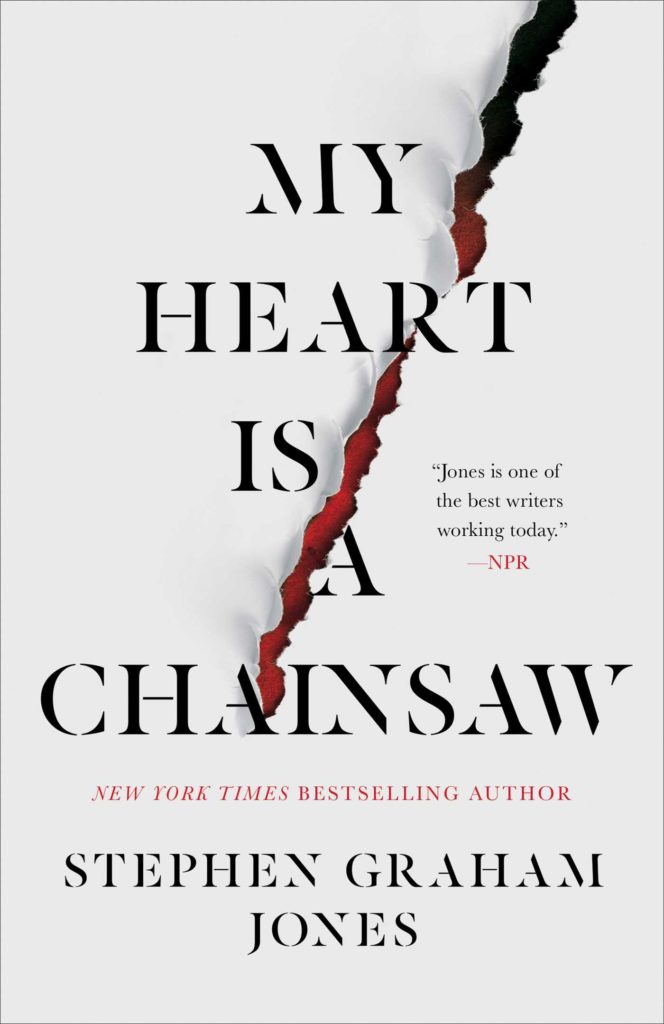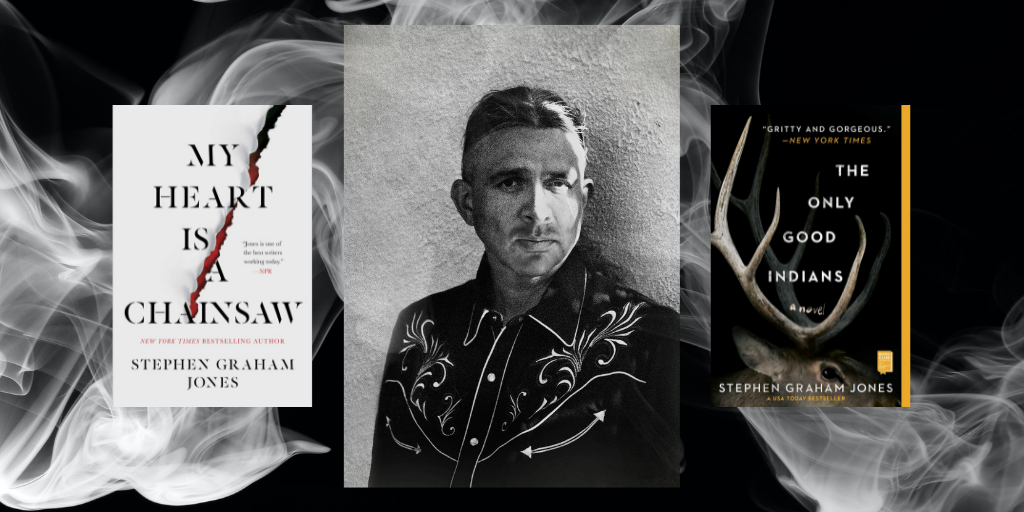A few years ago, I was scrolling through my Bookstagram feed, reading all of the latest posts from some of my favorite reviewers, when I came across a post about Stephen Graham Jones’ Mongrels. I immediately purchased a copy. That was my first Stephen Graham Jones novel; today, he is one of my favorite writers.
Jones is clearly a person who was born to write. Mongrels was the gateway into my Stephen Graham Jones obsession, which only grew with the release of The Only Good Indians in 2020. I immediately fell for these stories, and it seems every story I have read of his is a living, breathing entity. He writes in a multitude of genres and styles, but each story carries a beating heart. I am still making my way through his massive backlist, but I’m certain there is more literary gold to be found.
His latest release, My Heart Is a Chainsaw, is an homage to horror films, slasher tropes, and horror fans everywhere. If you haven’t read it yet, you’re in for a treat!
Janelle Janson: First off, congratulations on winning the Bram Stoker Award and Shirley Jackson Award for The Only Good Indians and Night of the Mannequins! It’s well deserved. And another congratulations on the launch of your newest novel, My Heart Is a Chainsaw. I have to admit, I’m a bit nervous because you’re such a gifted writer, and I didn’t know where to start. But, as they say, let’s begin at the beginning. Do you remember the moment you wanted to become a writer? How old were you? Do you remember the first short story you wrote?
Stephen Graham Jones: In fourth grade, it took me three check-out periods to finally get to the end of Wilson Rawls’ Where the Red Fern Grows, but I distinctly remember—spoiler, spoiler—closing that last page and holding my hand on that mass-market paperback and feeling inside that I can end like that, that I can hang a lantern on an axe sticking in a tree, and let it age for ten or twenty years. So, I was only ever going to be a farmer, that’s what you did where I grew up, but, from then on, anyway, I knew I could end things. I wouldn’t write my first story until I was nineteen, though, sitting in the waiting room of a burn unit ICU for three days and nights. All I had with me were a spiral and pen, and—got bored, y’know? I turned it into my Composition II instructor on Monday, after being gone the last two class meetings, and I was just doing it to prove to her that, while I hadn’t written what I was supposed to, I had been writing something, anyway. And? She liked it enough to type it up, enter it into a departmental contest, which I won. Since then, I’ve never stopped.
JJ: What is a book you love that people might be surprised by? What is the book you’ve read most? What is a book you always recommend?
SGJ: That Beautiful Boy book. Man, that just broke my heart, that father talking about losing his son to meth. I still think about it a lot, and a lot of parents and children are going through that. But, there’s also The Five People You Meet in Heaven. That one got to me as well. Oh, wait, I know the book I should have led with: The Magician of Lhasa, by David Michie. I bought a couple boxes of that one year and handed it out as gifts all around. The book I’ve read the most—well, “book”—is Strange Stories, Amazing Facts. Really, that compilation’s kind of been my bible since forever. I found it early-early in elementary and have been terrifying myself with it after lights out ever since. But the novel I’ve read the most is Jack Ketchum’s The Girl Next Door. Thirteen times, now. After it, I think I’ve read The Shining seven times, and The Crying of Lot 49 and VALIS and Love Medicine all… I don’t know, probably about seven or eight times each as well. A book I always recommend is Gemma Files’ Experimental Film. It just does everything right and leaves you feeling all wrong.
JJ: Can you write anywhere, any time, or do you need a specific setup? Are you surrounded by books? Sharp objects?! Is it true you type so hard that you are known to break keyboards?
SGJ: Never need a specific setup, can write wherever, however, doesn’t matter. I mean, if I have music, then it’s easier to block this bus station or that hotel lobby out better, sure. But, after a page or two, they all fall away just the same. If you trick yourself into believing you need this candle or that certain mug or a special pen or whatever to write, then you’re just stocking yourself with excuses not to write. “I don’t have my pen!” Man, scratch it in blood if you need to, the story doesn’t care, it’s all the same to the reader. And I am always surrounded by books, yep. Little towers everywhere. I can’t really see my desk right now from all the books, even, and haven’t seen it for a long time, I don’t guess. I just reach in through them for my keyboard.
And, yeah, there’s all kinds of sharp objects all around, within arm’s reach. Got a tactical tomahawk, looks like… three knives—no, four. Have a signed movie prop knife, too. And I’m constantly cutting myself with all of them, because I like to hold them, play with them, think with them. And, I did used to type hard enough that my keyboards would break. One of them, I remember, broke because I bled all into it. But, a year or two ago I invested in a good mechanical keyboard, a really sturdy one, and it seems able to take the many-many daily impacts. At least so far. But I’ve probably hammered, I don’t know, three or four novels into it.
JJ: Now onto our Guest (Book) of Honor, My Heart Is a Chainsaw. How long did it take you to write? How many drafts? Why did this particular project take longer than most?
SGJ: I don’t know how many drafts it took to get to where it is now, but I wrote it the first time in 2013, and I’d guess I probably got down… 750,000 words, to get to the 120,000 it is now? That feels about right. I did it ground-up just over and over, trying to find the real way through. I usually won’t stick with a book that long, as there’s more books to write—and I probably wrote, I don’t know, ten, fifteen novels since 2013—but I couldn’t seem to let go of Proofrock, of Indian Lake, of Terra Nova. Of Jade Daniels, and the purity and intensity of her vision. Or, it was like she kept grabbing my wrist, pulling my hand back to her story. Usually doesn’t happen that way, for me.

JJ: I wholeheartedly enjoyed the story of Jade and the town of Proofrock. Jade Daniels, in particular, is an intriguing character. She is the perfect representation of a horror fan and the driving force in the novel. She’s intelligent, strong, and self-assured. Do you identify with aspects of Jade’s character? Is there a piece of you in this novel?
SGJ: There’s a lot of pieces of me there, yeah. I was night janitor in high school for a while. I grew up in a small, rural town. I was sent home from school many times because of my t-shirt decisions. I found slashers in junior high, just like Jade. I lived by a lake one summer when I was about twelve. I once rolled out of a moving car I didn’t want to be in anymore, and got kind of banged up for it. I’m a die-hard slasher fiend. And my jaw’s all messed up—got broken in high school—so I’m always having to delicately manipulate it back into its proper hinge-point, which is more and more tricky to find every year. And the sheriff in Jade’s life, you can find him in another one of my books, too, which is to say, he’s from when I was in high school.
JJ: Proofrock is the quintessential setting for a real-life slasher-final-girl location. Where did Proofrock come from? Is it a nod to T.S. Eliot or maybe Stephen King’s Castle Rock?
SGJ: Was most definitely thinking of old J. Alfred, yeah. But, too, Henderson-Golding—Drown Town under the lake—started because of a silver strike, so “Proofrock” seemed like a good name for a mining town. Far back as I can recall, too, this was the only name the town ever had. Or, Proofrock had a name before Terra Nova did. Probably by a couple minutes. Camp Blood, though, Camp Blood’s been there since forever. It’s nested deep in all of our psyches. It’s embedded way down in the reptile part of the American psyche, I’d say.
JJ: The horror and slasher references are pure horror ecstasy for fans like myself. Jade’s encyclopedic knowledge of horror, which is dispersed throughout the story, is scintillating. The typed essays were a nice touch! What is it about the “final girl” trope that fascinates you? Is it important for readers to see the town and the goings-on through Jade’s eyes only?
SGJ: Those Slasher 101 pieces didn’t show up until late-late. Which is weird, as they’re kind of the key that unlocks the narrative, to me. Or, they take the strain off the rest of the story, let it breathe like it needs to, if that makes sense. I can’t imagine how I ever got along without them—without letting Jade speak like that. And, her take on final girls and my take are, surprise, one and the same. We both think the final girl is the vessel we keep our hope in. Final girls show us how to stand up against bullies. They show us how to insist on ourselves, in spite of everything. And that’s important, whether you’re dealing with some machete-wielder or a bad boss.
JJ: Camp Blood lives up to its name, but there are areas of the book that are slower-paced. I like the journey of getting to know the characters and the setting with a big payoff at the end, but some readers expect constant, rapid action. What would you say to skeptics who don’t associate the slasher trope with a slow-burn-style novel?
SGJ: I was just modeling on Scream, where you have two deaths up front, then it’s a long, long wait until Stu’s party. The principal does, um, meet his end before that party, but… there’s an analogue for that in My Heart is a Chainsaw.
JJ: I watched an interview where you said you create a soundtrack for every book you write. Did you make a soundtrack for My Heart Is a Chainsaw? Can readers gain access to it?
SGJ: I don’t know about gaining access, as Spotify refuses to send me the password I’ve forgotten, but… here, the first few tracks:
- “AbOriginal,” Frank Waln
- “Time Off for Bad Behavior,” David Allan Coe
- “Who Knew,” Pink
- “Thunder Road,” Bruce Springsteen
- “Let’s Go Crazy,” Prince and the Revolution
- “Mainstreet,” Bob Seger and the Silver Bullet Band
The rest is Alabama and Velvet Revolver, Leonard Cohen and Spandau Ballet, Melissa Etheridge and Tina Turner, The Killers and “Grease,” Dire Straits and Johnny van Zant and Sir Mix-a-lot, and, importantly—nobody listens to him anymore, and I can’t figure why—Webb Wilder, specifically “Tough it Out.” Oh, and some Def Leppard, of course. Is any playlist complete without them?
These artists and bands, these songs, in the order I need them, rocket me right back into the head- and heartspace of My Heart is a Chainsaw. They’re like a secret slide I can jump on, be instantly there.
JJ: I do not have a single negative word to say about My Heart Is a Chainsaw, except I want more! Is the rumor true? Is there a sequel on the horizon?
SGJ: There is. Can’t say a date yet, as I don’t know it, and I haven’t been released to let the title out yet. But, it’s written, is in edits already. I bet we’ll be seeing a cover at some point in the fall. Can’t wait. Not sure I’m ever really ever going to all the way leave Indian Lake. Not sure I really even want to.
JJ: Lightning round questions! What is your favorite word?
SGJ: I’ve always been sort of in love with “seatcover,” but only as one word. Least favorite? “Bro.”
JJ: Do you have a favorite quote?
SGJ: “Don’t stop believing”—Journey
JJ: What is your perfect last meal on Earth?
SGJ: A hamburger, with ketchup only. Well, okay: a triple-meat Whataburger, burned some, with ketchup only.
JJ: Do you believe in ghosts?
SGJ: How not to? Doesn’t even make sense.
JJ: And finally, is there a horror trope you don’t like?
SGJ: Talking film, and horror, and slashers in particular, I think nudity being compulsory hasn’t helped the stories get told any better. I’m glad it’s been happening less and less over the last couple decades.
JJ: Well, Professor Jones, master of writing, this has been an honor. Before we finish up, do you have any cool or exciting announcements you’d like to make?
SGJ: Just that we’re all in Proofrock, looking out across the glittering waters of Indian Lake at Terra Nova, sitting over there like Camelot. But it’s not. And the passage to get there is bloody and violent. And there’s nothing really wrong with Proofrock, anyway. Just sit on that bench, there, and watch the sun set, and be happy. Instead of very, very sad.
Whew, I can finally exhale. As you can see, Stephen Graham Jones does a top notch interview. I am mighty excited for the sequel to My Heart Is a Chainsaw and anything else his brilliant mind can conjure up.




Great job by both of you! I’m about 100 pages into Chainsaw… right now and loving it.
One of my favorite authors! I only recently discovered. Can’t wait to dive into his back catalog. The Only Good Indians is a masterpiece.